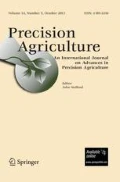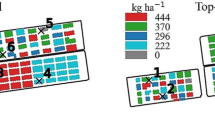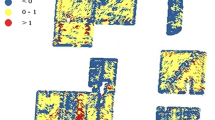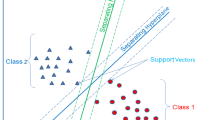Abstract
Jojoba Israel is a world-leading producer of Jojoba products, whose orchards are covered with sensors that collect soil moisture data for monitoring plant needs at real-time. Based on these data, the company’s agronomist defines a weekly irrigation plan. In addition, data on weather, irrigation, and yield are recorded from other sources (e.g. meteorological station and irrigation-plan records). However, so far, there has been no attempt to use the entire set of collected data to reveal insights and interesting relationships between different variables, such as soil, weather, irrigation characteristics, and resulting yield. By integrating and utilizing data from different sources, our research aims at using the collected data not only for monitoring and controlling the crop, but also for predicting irrigation recommendations. In particular, a dataset was constructed by integrating data collected over almost two years from 22 soil-sensors spread in four major plots (which are divided into 28 subplots and eight irrigation groups), from a meteorological station, and from actual irrigation records. Different regression and classification algorithms were applied on this dataset to develop models that were able to predict the weekly irrigation plan as recommended by the agronomist. The models were developed using eight different subsets of variables to determine which variables consistently contributed to prediction accuracy. By comparing the resulting models, it was shown that the best regression model was Gradient Boosted Regression Trees, with 93% accuracy, and the best classification model was the Boosted Tree Classifier, with 95% accuracy (on the test-set). Data that were not contributing to the model prediction success rate were identified as well. The resulting model can significantly facilitate the agronomist’s irrigation planning process. In addition, the potential of applying machine learning on the company data for yield and disease prediction is discussed.







Similar content being viewed by others
References
Allen, R. G. (1998). Crop evapotranspiration: Guidelines for computing crop water requirements (FAO irrigation and drainage paper. Rome: FAO.
Andriyas, S., & McKee, M. (2013). Recursive partitioning techniques for modeling irrigation behavior. Environmental Modelling & Software, 47, 207–217. doi:10.1016/j.envsoft.2013.05.011.
Bishop, C. M. (2006). Pattern recognition and machine learning (Information science and statistics). New York: Springer.
Breiman, L. (2001). Random Forests. Machine Learning, 45, 5–32. doi:10.1023/A:1010933404324.
Cai, Q., Xue, Z., Mao, D., Li, H., & Cao, J. (2016). Bike-Sharing Prediction System. In A. El Rhalibi, F. Tian, Z. Pan, & B. Liu (Eds.), E-Learning and Games Lecture Notes in Computer Science (pp. 301–317). Cham: Springer.
Castle, M., Lubben, B. D., & Luck, J. (2015). Precision agriculture usage and big agriculture data (Cornhusker Economics). http://agecon.unl.edu/cornhusker-economics/2015/precision-agriculture-usage-and-big-agriculture-data. Accessed 24 Jan 2017.
Damas, M., Prados, A., Gómez, F., & Olivares, G. (2001). HidroBus® system: fieldbus for integrated management of extensive areas of irrigated land. Microprocessors and Microsystems, 25, 177–184. doi:10.1016/S0141-9331(01)00110-7.
de Miranda, F. R. (2003). A Site-Specific Irrigation Control System. American Society of Agricultural and Biological Engineers. doi:10.13031/2013.13740.
Elith, J., Leathwick, J. R., & Hastie, T. (2008). A working guide to boosted regression trees. Journal of Animal Ecology, 77(4), 802–813.
Evans, R., & Bergman, J. (2007). Relationships between cropping sequences and irrigation frequency under self-propelled irrigation systems in the Northern Great Plains (NGP) (5436-13210-003-02). http://www.reeis.usda.gov/web/crisprojectpages/0406839-relationships-between-cropping-sequences-and-irrigation-frequency-under-self-propelled-irrigation-systems-in-the-northern-great-plains-ngp.html. Accessed 8 Jul 2016.
Fayyad, U. M. (1996). Advances in knowledge discovery and data mining. Cambridge: MIT Press.
Hedley, C. B., Roudier, P., Yule, I. J., Ekanayake, J., & Bradbury, S. (2013). Soil water status and water table depth modelling using electromagnetic surveys for precision irrigation scheduling. Geoderma, 199, 22–29. doi:10.1016/j.geoderma.2012.07.018.
Jensen, A. L., Boll, P. S., Thysen, I., & Pathak, B. (2000). Pl@nteInfo® — a web-based system for personalised decision support in crop management. Computers and Electronics in Agriculture, 25, 271–293. doi:10.1016/S0168-1699(99)00074-5.
Kennedy, S., & Tobler, W. R. (1983). Geographic Interpolation. Geographical Analysis, 15, 151–156. doi:10.1111/j.1538-4632.1983.tb00776.x.
Labbé, F., Ruelle, P., Garin, P., & Leroy, P. (2000). Modelling irrigation scheduling to analyse water management at farm level, during water shortages. European Journal of Agronomy, 12, 55–67. doi:10.1016/S1161-0301(99)00043-X.
Lilburne, L., Watt, J., & Vincent, K. (1998). A prototype DSS to evaluate irrigation management plans. Computers and Electronics in Agriculture, 21, 195–205. doi:10.1016/S0168-1699(98)00035-0.
Liu, B. (2011). Web data mining: Exploring hyperlinks, contents, and usage data. Heidelberg, New York: Springer.
Liu, Y., Ren, Z.-h, Li, D.-m, Tian, X.-k, & Lu, Z.-n. (2006). The Research of Precision Irrigation Decision Support System Based on Genetic Algorithm. International Conference on Machine Learning and Cybernetics. doi:10.1109/ICMLC.2006.258403.
Loh, W.-Y. (2011). Classification and regression trees. Wiley Interdisciplinary Reviews, 1, 14–23. doi:10.1002/widm.8.
Mateos, L., López-Cortijo, I., & Sagardoy, J. A. (2002). SIMIS: The FAO decision support system for irrigation scheme management. Agricultural Water Management, 56, 193–206. doi:10.1016/S0378-3774(02)00035-5.
Mease, D., Wyner, A. J., & Buja, A. (2007). Boosted Classification Trees and Class Probability/Quantile Estimation. The Journal of Machine Learning Research, 8(5), 409–439.
Mitchell, T. M. (1997). Machine Learning (McGraw-Hill series in computer science). New York, London: McGraw-Hill.
Murase, H., Honami, N., & Nishiura, Y. (1995). A nueral Netwerk Estimation Technique for Plant Water Status Using the Textural Features of Pictorial Data Plant Canopy. Acta Horticulturae. doi:10.17660/ActaHortic.399.30.
Smith, D., & Peng, W. (2009). Machine learning approaches for soil classification in a multi-agent deficit irrigation control system. IEEE International Conference on Industrial Technology—- (ICIT), Churchill, Victoria, Australia. doi:10.1109/ICIT.2009.4939641.
Sørensen, C. G., Fountas, S., Nash, E., Pesonen, L., Bochtis, D., Pedersen, S. M., et al. (2010). Conceptual model of a future farm management information system. Computers and Electronics in Agriculture, 72, 37–47. doi:10.1016/j.compag.2010.02.003.
Thysen, I., & Detlefsen, N. K. (2006). Online decision support for irrigation for farmers. Agricultural Water Management, 86, 269–276. doi:10.1016/j.agwat.2006.05.016.
Vellidis, G., Liakos, V., Porter, W., Tucker, M., & Liang, X. (2016). A Dynamic Variable Rate Irrigation Control System. St. Louis, Missouri: Academic Publishers.
Vellidis, G., Tucker, M., Perry, C., Reckford, D., Butts, C., Henry, H., et al. (2013). A soil moisture sensor-based variable rate irrigation scheduling system. In J. V. Stafford (Ed.), Precision agriculture ‘13. The Netherlands: Wageningen Academic Publishers.
Yunseop, K., Evans, R. G., & Iversen, W. M. (2008). Remote Sensing and Control of an Irrigation System Using a Distributed Wireless Sensor Network. IEEE Transactions on Instrumentation and Measurement, 57, 1379–1387. doi:10.1109/TIM.2008.917198.
Zhang, N., Wang, M., & Wang, N. (2002). Precision agriculture—a worldwide overview. Computers and Electronics in Agriculture, 36, 113–132. doi:10.1016/S0168-1699(02)00096-0.
Zou, H. (2006). The Adaptive Lasso and Its Oracle Properties. Journal of the American Statistical Association, 101, 1418–1429. doi:10.1198/016214506000000735.
Acknowledgement
This study has been funded by the Israeli Ministry of Agriculture and Rural Development, Grant Number 458-0603/l3.
Author information
Authors and Affiliations
Corresponding author
Appendix
Appendix
Linear regression coefficients. See Table 9.
Rights and permissions
About this article
Cite this article
Goldstein, A., Fink, L., Meitin, A. et al. Applying machine learning on sensor data for irrigation recommendations: revealing the agronomist’s tacit knowledge. Precision Agric 19, 421–444 (2018). https://doi.org/10.1007/s11119-017-9527-4
Published:
Issue Date:
DOI: https://doi.org/10.1007/s11119-017-9527-4




